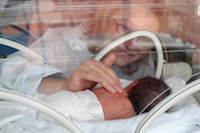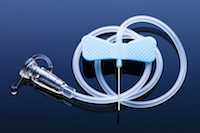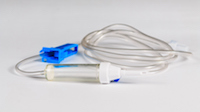LAWSUITS NEWS & LEGAL INFORMATION
Defective Catheter Legal News Articles & Interviews
Bard PowerPort Bellwether Trial Process on Time
 April 19, 2024. By Jane Mundy.
April 19, 2024. By Jane Mundy.Attorney Discusses Bard Power Port Failures and Lawsuits
 November 2, 2023. By Jane Mundy.
November 2, 2023. By Jane Mundy.Unnecessary and Defective Catheter?
 November 4, 2017. By Jane Mundy.
November 4, 2017. By Jane Mundy.Santa Clara, CA: The number of catheters reported to be defective over the last few years is mind-boggling. Over the past year alone several medical device manufacturers have recalled a combined four million catheters. Why so many? A study published yesterday may give one explanation.
Read [ Unnecessary and Defective Catheter? ]
The Recalled Fetch 2 Aspiration Catheter Received FDA 510(k) Clearance
 October 8, 2017. By Gordon Gibb.
October 8, 2017. By Gordon Gibb.Washington, DC: When the Fetch 2 Aspiration Catheter was originally launched by Bayer Medical Care Inc., (Bayer), there was no shortage of platitudes which, sometime later presented as a stark contrast to the eventual global recall that resulted in many a lawsuit amidst allegations of defective catheters causing injury.
“Why Use Fetch 2 Aspiration [Catheter]?” was a question posed by the online brochure posted by Bayer when the device was released. “You choose a manual aspiration device for its ease of use and its ability to quickly resolve small, fresh thrombus, in coronary arteries. The Fetch 2 Aspiration Catheter offers enhanced handling and kink resistance thanks to a variable pitch coiled proximal shaft. You want to reach into small vessels and cross tight lesions. The Fetch 2 Aspiration Catheter can get you there with a low 4.2 French catheter profile and convex-cut opening to reduce risk of vessel wall damage.
“Finally, you want your aspiration device to effectively restore flow. The Fetch 2 Catheter has demonstrated effective clot removing ability, despite its low profile.”
Those lofty platitudes soon evaporated, however when the Fetch 2 Aspiration Catheter was recalled in March of last year over complaints related to breakage associated with the device shaft.
The recall, initiated by medical device manufacturer Boston Scientific Corporation (Boston Scientific) after acquiring the Fetch 2 catheter product line from Bayer, was a voluntary recall nonetheless
“Boston Scientific Corporation is recalling the Fetch 2 Aspiration Catheter because the catheter shaft may break at various points along the device, before or during procedures,” the
A Class 1 recall, under which the Fetch 2 fell, is considered the most serious recall available to be issued by the FDA. “Use of these devices may cause serious injury or death,” the regulator said in its recall notice.
The catheters were recalled simultaneously in the US and in Canada on March 22 of last year. Less than a month later Boston Scientific issued a press release dated April 8, 2016 formally announcing the recall.
The recall was officially terminated about 16 months later, August 11 of this year. The official posting on the FDA website indicates the Fetch 2 Aspiration Catheter was among the scores of problematic medical devices initially approved through an FDA 510(k) Clearance [#K101354]. Approved under a substantially equivalent (SESE) designation, the decision reflects no third party review.
Why so many Catheters Recalled?
 September 27, 2017. By Jane Mundy.
September 27, 2017. By Jane Mundy.Santa Cruz, CA: Another catheter was recalled last week, and this one got a Class 1 recall category, meaning the most serious kind.
The FDA recalled a bridge occlusion balloon catheter “due to the possibility of blocked guidewire lumen in select device units”. The Bridge Occlusion Balloon Catheter, made by Spectranetics, is designed to temporarily block the superior vena cava in the event of hemorrhage, according to the alert. The company sent a notice directing physicians to confirm that the guidewire lumen is open and unblocked prior to start of the procedure and to have backup units on hand, and the FDA stated that Spectranetics recommends health care professionals and patients report any adverse events or side effects related to the use of the product to the FDA’s MedWatch Safety Information and Adverse Event Reporting Program.
But what are the chances of a patient reporting an adverse event, given that the balloon catheter has been slapped with a Class 1 recall? The
Why are so many catheters recalled?
To start with, catheters are flexible tubes inserted through narrow openings into body cavity. The recalled catheters are not urinary catheters; those recalled are used for medical procedures, such as injecting dye for angiograms, or removing small blood clots from veins and arteries. According to the Journal of Medical Engineering & Technology the problem with the affected catheters is that they are prone to degrade and fracture. Tips and other components have broken or separated, resulting in serious patient injuries, and even in patient death. Once these fractures have broken loose, they can potentially float freely in the bloodstream and travel to the heart, lungs, or other vital organs. Hence a Class I recall.
But liability has yet to be definitively determined: At what point during manufacture have the catheter defects occurred? One law firm, Chandler Mathis Zivley, says that, “Investigators are now looking into the possibility that corners have been cut in attempts to streamline costs, resulting in products that are less sturdy and more prone to fail during use. One aspect of the investigation is focused on whether having products manufactured offshore, in an attempt to improve efficiency and lower costs, has resulted in inadequate testing and insufficient supervision that may underlie the problems.” Stay tuned…
Mother and Nurses Blame Catheter for Baby’s Death
 August 3, 2017. By Jane Mundy.
August 3, 2017. By Jane Mundy.Another Catheter Recalled
 July 23, 2017. By Jane Mundy.
July 23, 2017. By Jane Mundy.Washington, DC: Yet another catheter recall has been issued by the FDA. Vascular Solutions, Inc. recalled its Venture Catheters because they can potentially cause a blood clot, which can result in serious injury and even death.
Read [ Another Catheter Recalled ]
Recalled Catheters All Approved Through FDA 510(k) Clearance Protocol
 June 20, 2017. By Gordon Gibb.
June 20, 2017. By Gordon Gibb.Washington, DC: Various reports of defective catheters causing injury have also been associated with product recalls initiated by respective manufacturers and supported by the US Food and Drug Administration (FDA).
Read [ Recalled Catheters All Approved Through FDA 510(k) Clearance Protocol ]
Catheter Injury Lawsuits following Catheter Recalls
 May 20, 2017. By Jane Mundy.
May 20, 2017. By Jane Mundy.Dallas, TX: In the wake of more than four million catheter recalls over the past year by numerous medical device manufacturers, dozens of patients have reported injuries and two wrongful death lawsuits have been filed due to broken catheters.
Read [ Catheter Injury Lawsuits following Catheter Recalls ]
Will Federal Deregulation make it Easier for Plaintiffs to Sue over Defective Catheters?
 April 19, 2017. By Gordon Gibb.
April 19, 2017. By Gordon Gibb.Washington, DC: We are just a few days beyond the one-year anniversary of the issuance, by the US Food and Drug Administration (FDA), of a Class 1 designation to the recall of the Fetch 2 Aspiration Catheter by medical device manufacturer Boston Scientific. The voluntary recall was triggered by the manufacturer the previous month, on March 22, 2016.
Read [ Will Federal Deregulation make it Easier for Plaintiffs to Sue over Defective Catheters? ]
- FDA Issues Recall on Medtronic Implantable Pain Pumps By Deb Hipp (Mar-17-17)
- Latest Defective Catheter Takes Its Place in Long Line of FDA Recalls By Deb Hipp (Feb-8-17)
- Catheter Recalls Number into the Millions. Will Lawsuits Follow? By Gordon Gibb (Jan-17-17)
- Recalls Over Catheter Fragments Increasing, More Manufacturers Involved By Gordon Gibb (Dec-16-16)
- Will Recalled Surgical Catheters Spark Lawsuits? By Gordon Gibb (Oct-12-16)
- FDA, Thomas Medical Issue Class 1 Recall of Coronary Sinus Guide Systems By Lucy Campbell (Feb-4-10)
